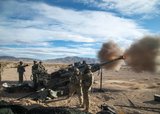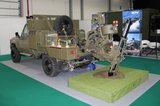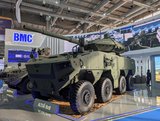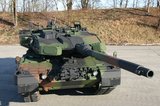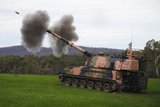Rheinmetall selected for Hungarian MBT and howitzer work
Rheinmetall has been selected to deliver armament and hulls for the Hungarian army’s new PzH 2000 self-propelled howitzer and Leopard 2 main battle tanks.
Worth some €300 million, the contract will result in deliveries beginning in 2021 and completing in 2025, under which the main armament and fire control technology for 44 Leopard 2s and main armament, fire control capability and chassis for 24 PzH 200s will be provided.
The contract also includes 13 HX and TGS logistics trucks, and Rheinmetall has been selected by Krauss-Maffei Wegmann (KMW) to carry out the work.
In December 2018, KMW won an order from the Hungarian armed forces for 44 new Leopard 2A7+ tanks and 24 new PzH 2000 self-propelled howitzers, making the nation the 19th Leopard 2 user and 8th to select the PzH2000.
Rheinmetall is the OEM of the 120mm smoothbore technology used in all versions of the Leopard 2 tank, as well as the 155mm L52 main gun of the PzH 2000 self-propelled howitzer.
A higher-pressure 120mm L55A1 gun for the Leopard 2A7+ was qualified at the end of 2017, having been subsequently supplied and installed on Leopard 2s for two operators in mid-2018, and the tank gun is capable of firing the programmable DM11 multipurpose round.
Related Equipment in Defence Insight
More from Land Warfare
-
![MKJ Warrior Series — The Nett Warrior Qualified Connector for Today’s Soldier Systems]()
MKJ Warrior Series — The Nett Warrior Qualified Connector for Today’s Soldier Systems
ITT Cannon’s MKJ Warrior connectors are designed for the harshest environments, delivering mission critical comms, navigation and USB data/power.
-
![Active vehicle protection comes to the forefront as Trophy and Iron Fist secure contracts]()
Active vehicle protection comes to the forefront as Trophy and Iron Fist secure contracts
Experience on the battlefield is accelerating the adoption of active protection systems as technologies continue to evolve to reflect shifting global defence needs.
-
![World Defense Show 2026: Hanwha increases Middle East presence and reveals Tigon 6x6 sale]()
World Defense Show 2026: Hanwha increases Middle East presence and reveals Tigon 6x6 sale
Shephard sat down with Hanwha Middle East and Africa president Sung Il at World Defense Show 2026 to hear about the company’s plans for the region and how it plans to use local industry success to win deals.









